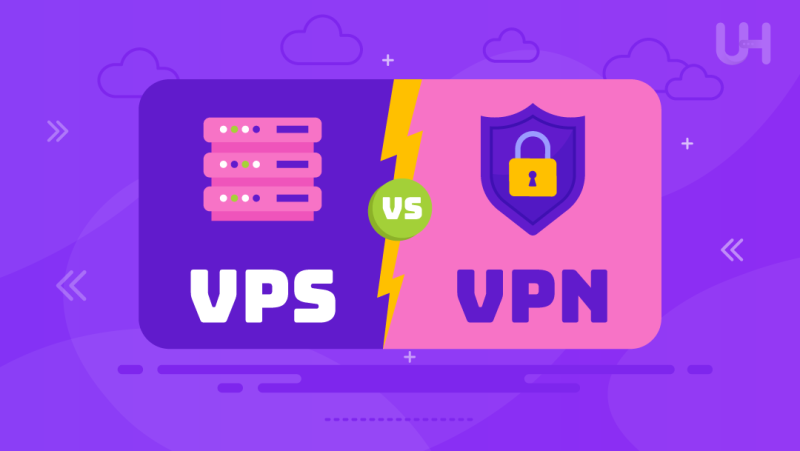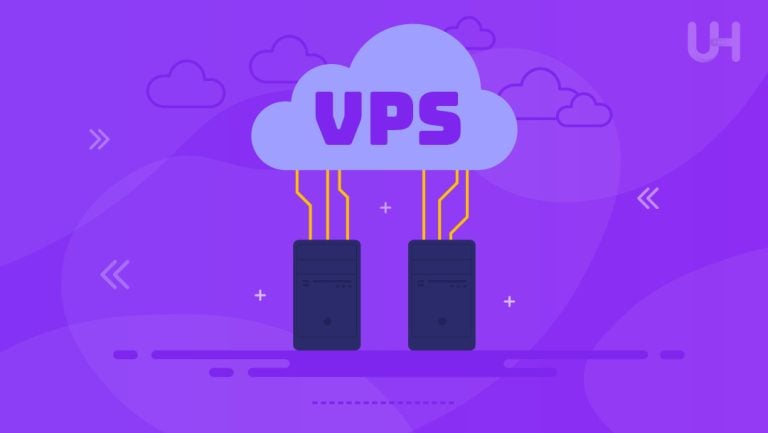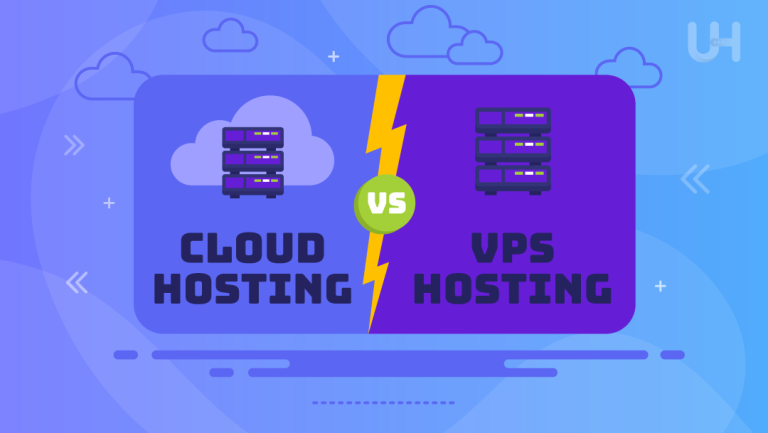When you’re working with online services, you sometimes hear two terms that sound similar: VPS, or Virtual Private Server, and VPN, which stands for Virtual Private Network. While the names bear some resemblance, they do very different things. Knowing the difference between VPS vs VPN will help you decide what’s right for your needs, whether it’s boosting your website’s performance or protecting your online privacy.
In this blog, we will discuss what a VPS and a VPN are, the difference between them, and when each of them comes into use.
What is a VPS?
The Virtual Private Server is a virtualized environment, created on a physical server, using virtualization technology. This is the kind of technology that allows one physical server to be divided into multiple virtual servers, running their own OS and a certain set of independent resources, apart from one another. In contrast to shared hosting, which means sharing the same resources with lots of users, VPS provides dedicated resources like CPU, RAM and storage that guarantee smooth performance and more control over the server environment.
In a VPS, the customer can add their own software, reconfigure the server settings to an extent, and even their own security measures, much like they may do on their very own dedicated server but at far lower costs. It acts as an ideal way out for every business, developer, and person needing more power and flexibility than those afforded by shared hosting servers, yet who don’t need to pay for a full or dedicated server. Besides, security and stability are improved because each VPS on the physical server is separate in its way, so this means that activities by one user can’t affect the other people on the same machine.
Common Uses of VPS
The general purpose of a VPS is to host websites and applications that require dedicated resources and more control than shared hosting can offer. It is also ideal for custom software environments where users install and configure applications or services in accordance with their needs. Additionally, a VPS provides a secure platform for testing and development the environment of a website or application, testing new features in a controlled environment, and deploying updates without disrupting live applications.
Key Features of VPS
It offers a number of great advantages that make VPS attract a lot of people to choose it. Firstly, it’s much cheaper than having a dedicated server but still offers full control over a portion of resources, therefore offering better performance with better value for your money. Secondly, VPS is highly scalable and flexible; users can scale up resources like CPU, RAM, and storage with ease according to their growing needs without necessarily migrating to another server. Finally, with full control over a VPS, users are able to install custom software, configure settings on the server, and manage security based on their specific needs, which greatly extends the range of possible applications.
Pros of VPS
- Dedicated Resources and Control: This provides for certain resource allocations such as CPU, RAM, and storage, inclusive of root access to give one full control over the server for customization.
- Scalability and Flexibility: Resources can be scaled up and down with ease based on changing demands without much downtime.
- Cost-effective solution: Reasonably cheap compared to a dedicated server. It nonetheless provides dedicated resources, just like those of a dedicated server, and better performance compared to shared hosting.
Cons of VPS
- Technical Expertise Required: Managing a VPS requires technical expertise in configuration, maintenance, and security.
- Higher Cost Than Shared Hosting: More expensive compared to shared hosting plans, so this might be a point of concern for some users on a tight budget.
- Less Resources Compared to Dedicated Servers: While dedicated, resources also share the VPS physical server, translating to less capability when compared to a dedicated server.
Ready to Choose the Right Solution for Your Needs?
If you’re looking for reliable hosting with a VPS to power your website or online services, explore affordable and high-performance options from Ultahost.
What is a VPN?
A VPN is any service that connects through the Internet a user’s device to a remote server in a safe and secure, encrypted manner. This secure tunnel basically encrypts data transmitted between the device and the server and keeps it safe from interception by any hacker or any other third party. It also masks the user’s dedicated IP address to make online activities private and enables users to access geo-restricted content as if they were residing in another region.
Common Uses of VPN
A VPN is usually helpful for enhancing privacy and security through the encryption of internet traffic and the user’s IP address, hence protecting this sensitive information from potential threats. Besides that, one could also access geo-restricted content by making a user appear as if they are browsing from a location far away, bypassing regional restrictions. In addition, VPNs offer users secure browsing, even over public Wi-Fi, keeping your data away from potential eavesdroppers and guaranteeing a very secure connection even in unsecured environments.
Key Features of VPN
A VPN provides a variety of key benefits, which include data security from hackers and third parties through encrypting of the internet traffic, which will keep sensitive information safe from any prospective interception. It allows users to bypass censorship and geo-blocks by masking IP addresses and making it appear as though they are accessing the internet from another location, thus allowing access to restricted content. Moreover, a VPN anonymizes online activity by masking one’s IP address, thereby granting enhanced data privacy and making it more difficult for authorities to track down the user through online activity.
Pros of VPN
- Privacy and Security: Encrypts internet traffic from hackers and surveillance.
- Access to Restricted Content: Access content or services that may be restricted in a particular region through geo-blocks and censorship.
- Anonymity: Allows masking of IP addresses hence making it hard to trace activities online; increases privacy.
Cons of VPN
- Speed Reduction: In the processes it may involve encrypting and routing of traffic through a VPN server, in almost all cases, reduced internet speeds are realized.
- Compatibility Issues: Some sites and services do not work right when connected through a VPN or block VPN traffic.
- Subscription Costs: Good services often require subscriptions, which can be an added cost for users.
Looking for Secure and Private Hosting?
If privacy is your top concern, why not combine the power of a VPS with the security of anonymity? With Ultahost’s Anonymous VPS Hosting, you can get dedicated resources while keeping your identity protected.
Comparing Features of VPS vs VPN
VPS vs VPN: Primary Purpose
Virtual Private Server: VPS is designed to offer a virtual environment of the server in the physical server. It allows the hosting of websites, applications, and databases with independent resources for CPU, RAM, and storage that give users total control over the environment of the server and full self-configuring, installation of custom software, and execution of tasks that require a controlled and isolated environment. The most typical use cases for VPS would include website hosting, complex applications, and development or testing, for which dedicated resources would prove critical.
Virtual Private Network: VPN establishes security by encrypting the tunnel between the user’s device and a server elsewhere. This connection protects data transmitted over the Internet through encryption, hence protecting it from potential interception by hackers or surveillance by third parties. The major use cases for VPNs include increasing online privacy, accessing geographic restriction free content, and securing the data transmission across public Wi-Fi. A VPN does not provide server resources or hosting capability, but instead secures and anonymizes the use of the Internet. VPNs offer significant benefits for ensuring internet privacy and security, as well as granting access to geo-restricted content. While they generally maintain strong data encryption and anonymity, choosing a premium VPN service such as Bitdefender’s can further boost privacy measures with features like traffic encryption and worldwide server accessibility. This provides users not only with protection from hackers on public Wi-Fi but ensures high-speed browsing experiences across diverse platforms.
VPS vs VPN: Technical Setup
Virtual Private Service: To set up a VPS, one needs to have some technical know-how. You are supposed to manage your server environment and configure installation, maintenance, and security settings, among other administrative tasks in server administration. Many users of VPS enjoy root or administrative access, thus allowing them to make changes to the server environment where specific needs have to be achieved. This includes setting up web application firewalls, managing user permissions, and performing regular maintenance and updates.
Virtual Private Network: One of the great things about VPNs is that, compared to VPS, they’re often way easier to set up. Most VPN services provide very user-friendly applications that can be installed on a lot of devices, from computers to smartphones and tablets. After installation, all they need to do is log on and connect to one of the VPN’s servers. Generally speaking, setting up doesn’t require special technical knowledge and will consist of choosing a server location and adjusting some basic settings. Most of the time, VPN services include security features right out of the box and with automatic updates, requiring minimal if any hassle from the end user.
VPS vs VPN: Resource Allocation
Virtual Private Service: The network environment, in turn, allocates resources from the physical server to a virtual environment. This includes such aspects as dedicated CPU, RAM, and storage. Applications and services operating on the VPS will have consistent and predictable performances. In regard to the way these resources are put to use, it usually falls solely at the discretion of users and thus tends to be crucial for such applications that have high-performance demands or for applications that stipulate resource requirements. This is quite contrary to shared hosting, whereby users share the hosting resources, which may result in lag periods.
Virtual Private Network: VPNs do not provide dedicated server resources like VPSs do. They route web traffic through a VPN server, which sometimes causes slow browsing and performance issues. Performance will impact the distance to the VPN server, the load of the server, and the grade of encryption. A key difference with VPS, where resource allocation was one of the core features, VPN focuses mainly on securing and anonymizing internet traffic without providing dedicated server resources.
VPS vs VPN: Security and Privacy
Virtual Private Service: In a VPS, the security is maintained by the user. Whereas, normally, the VPS provider takes care of the security of the physical server and makes some elementary preparations to provide security, it depends upon the users to establish security protocols themselves. This includes configuring firewalls, establishing intrusion detection systems, and making software updates available. The level of security provided by a VPS will depend upon how well users manage and maintain their server environment.
Virtual Private Network: The VPN itself is designed to have inbuilt security that scrambles internet traffic and masks the IP addresses of users. Such scrambling keeps data from being intercepted and accessed while masking users’ locations enhances privacy. They protect against transmissions via unsecured public Wi-Fi networks, where attacks are always prevalent. The security and privacy of the VPN depend on the robustness of the encryption protocols in use, and on how much the VPN provider is trusted.
VPS vs VPN: Use Cases
Virtual Private Service: This is supposed to be great for use cases that require dedicated resources and full control over a server environment, such as hosting websites and web applications, managing databases, running custom software, or development environments. For businesses or developers wanting configuration and scaling capabilities of server resources for their specific needs, a VPS is fairly flexible for an array of technical needs.
Virtual Private Network: This technology is targeted at users who want data privacy and data security during internet browsing. It will work effectively in protecting sensitive data on public Wi-Fi, accessing geo-restricted content, and bypassing internet censorship. VPNs are utilized by many for anonymity online, trying to get around content filters, or simply for secure communication over untrusted networks.
Choosing the Right Option for Your Needs: VPS vs VPN

Assess Your Requirements
Virtual Private Server: In case your needs lie in a virtualized environment of a server with dedicated resources, be it for hosting websites, managing applications, or running your custom software, then a virtual private server is ideal for you. If you need special configurations of servers, with resource allocation and scaling according to demand, then a VPS is what fits best. It offers a wide range of flexibility that can meet the needs of most intensive applications and complex environments. However, having or acquiring the technical expertise to manage and configure the server is very important.
Virtual Private Network: VPN is best for enhancing online privacy, security of data transmission, and geo-restricted content. If the main aim is protection against data from hackers, bypassing internet censorship, or browsing safely on public Wi-Fi, then a VPN is what one needs. Fairly simple to use, and doesn’t require much technical knowledge, so it is practical for both individual and organizational purposes whenever one seeks simple ways to increase privacy and security.
Consider Technical Expertise
Virtual Private Server: The management of a VPS requires some technical knowledge. You will need to configure servers, install software, and operate the security of your server. In case you or your team have the technical acumen to handle these tasks, a VPS will come in handy, giving you enormous flexibility in customizing things and handling resources. If not, then you may have to opt for managed VPS services, wherein the service provider manages most of the tasks for you, especially in terms of server management.
Virtual Private Network: Generally, setting up and using a VPN is easy. Most of the VPN services have user-friendly applications and clear installation instructions. Since VPNs simply aim at securing your internet access and privacy, therefore, as such, they are less technical to manage like the VPS. In that respect, it makes VPNs accessible to users desiring privacy and security without having to navigate through complicated configurations.
Evaluate Performance Needs
Virtual Private Server: You get dedicated CPU, RAM, and storage; hence, with this type of solution, performance will always be consistent for both applications and sites. In the case of high-demand performance or if applications involve high resources, it is possible to configure a VPS to meet those requirements. You can also modify resources according to your needs, useful in managing various forms of traffic and computations.
Virtual Private Network: While it secures your Internet connection, it can affect your browsing speed due to the encryption process and routing traffic through VPN servers. So if the speed factor is very crucial in your activities, go for a good quality VPN service that avails fast servers. But if the speed is not as crucial as privacy and security, you have the VPN for good protection while doing online activities.
Budget Considerations
Virtual Private Server: The overall pricing for a VPS is usually higher than that of shared hosting but lower than that of a dedicated server. It offers a balance between cost and control, providing you with resources taken by a dedicated server at lower prices compared to the latter. Consider a VPS if you need dedicated server capabilities but want to keep costs in check.
Virtual Private Network: This typically requires a subscription to a service that generally requires less cost compared to VPS and dedicated servers. It adds value to the added privacy and security the VPN provides. When one is after keeping his online activities secure, he needs to go for restricted content in a cheaper way; a VPN should be the option.
By carefully considering your specific needs, technical capabilities, performance requirements, budget constraints, and intended use cases, you can determine whether a VPS or a VPN is the more suitable solution for your situation.
Future Growth and Scalability
VPS (Virtual Private Server): A VPS is very scalable. This ability to scale, in general through a control panel from your hosting service, is common among these other resources: CPU, RAM, and storage. This allows scalability when one needs more significant computational resources, larger increases in traffic, or more apps without needing to change the server type. Some VPS providers even let you scale vertically-increasing resources on the same server-and even horizontally by adding more servers-to further accommodate growth.
In case of growth in your business or project, you upgrade your VPS plan or scale up resources. This growth is pretty smooth since most vendors allow scaling up with minimal downtime. For even larger use cases, scaling a VPS up to a dedicated server or cloud-based solution is possible and even migrating all your data and applications when needed.
VPN (Virtual Private Network): VPNs are not about scalability in the classic sense but rather about increasing the number of users or devices that can connect through the VPN. Most commercial VPN services allow multiple simultaneous connections while configuring enterprise solutions to handle growing numbers of users or connections. Scaling typically involves the addition of more VPN licenses or the building out of server infrastructure to manage additional traffic for businesses.
A VPN service may grow in the future, based on the infrastructure of the provider and its capability to handle more connections and traffic. To users, growth may mean the need for additional features such as more server locations or higher bandwidth limits. Businesses may require more advanced VPN solutions that support a greater number of employees or integrate into other systems at the enterprise level. Most VPN services are upgrading infrastructure on a continual basis, adding more servers, increasing security, and expanding service.
When to Use VPN vs VPS?
Choosing between a VPS and a VPN depends on your specific needs and use cases. Here’s a detailed breakdown to help you make an informed decision:
When to Use a VPS
- Hosting Websites or Applications:
- Dedicated Resources: A VPS provides a dedicated portion of a physical server’s resources (CPU, RAM, storage) just for you. This makes it ideal for hosting websites, blogs, or applications that require reliable performance and resources beyond what shared hosting can offer.
- Customizable Environments: With a VPS, you have full control over your server environment. You can install and configure software, manage databases, and customize settings to suit your specific needs.
- Running Custom Software:
- Flexibility: If you need to run specialized applications or software that requires a specific server setup, a VPS gives you the flexibility to configure the server to meet those requirements. This is particularly useful for developers and businesses with unique software needs.
- Scaling Resources:
- Growth Management: As your website or application grows, you can easily scale the resources of your VPS to accommodate increased traffic or additional demands. This scalability ensures that your online services remain stable and performant as your needs evolve.
- Enhanced Control and Security:
- Administrative Access: A VPS gives you root or administrative access, allowing you to implement advanced security measures, perform regular backups, and manage your server’s overall health and performance.
When to Use a VPN
- Ensuring Online Privacy:
- Encryption: A VPN encrypts your internet connection, protecting your data from hackers or other third parties. This is especially important when using public Wi-Fi networks or browsing sensitive information.
- Anonymous Browsing: By masking your IP address, a VPN helps maintain your anonymity online. It prevents websites and advertisers from tracking your browsing activities.
- Accessing Restricted Content:
- Bypassing Geo-Restrictions: Many online services and content are restrict due the geographic location. A VPN can make it appear as though you’re browsing from a different country. Therefore, it allows you to access content that might be unavailable in your region.
- Securing Data on Public Networks:
- Protection on Public Wi-Fi: Public Wi-Fi networks are often less secure and can be vulnerable to cyber attacks. Using a VPN on these networks helps encrypt your data and protect it from potential threats.
- Avoiding Censorship:
- Accessing Blocked Websites: In regions where internet access is censored or restricted, a VPN can help you bypass these restrictions and access blocked websites or services.
Using Both VPS and VPN
In some cases, you might benefit from using both a VPS and a VPN together. For example, you can host your website or application on a VPS while using a VPN to secure your connection when managing or accessing the server remotely. Additionally, using an anti-detect browser like Multilogin alongside a VPN can further protect your identity and prevent fingerprint tracking while managing your VPS. This combination provides both the performance and control of a VPS with the enhanced privacy and security of a VPN. By understanding these scenarios, you can better determine whether a VPS, VPN, or both are the right solutions for your specific needs.
Conclusion
Understanding the differences between a VPS and VPN will help you choose one or the other for your needs. The VPS offers a committed environment with its own server control, mainly utilized in websites, applications, and database management that require resource specification. On the other hand, VPN targets enhancing privacy and security through internet traffic encryption and IP masking. Therefore, making it quite useful in safeguarding data and unlocking content with access restrictions.
With different tools performing different functions and sometimes being priceless in that regard, both fall into distinct uses, with selection dependent on whether your aim is at server management or enhanced online security.
If you’re ready to take the next step, consider exploring budget-friendly VPS options. Explore low cost VPS hosting with Ultahost and find the perfect solution for your online projects today!
FAQ
What is a VPS?
A VPS (Virtual Private Server) is a virtual server that provides dedicated resources for hosting websites or apps.
What is a VPN?
A VPN (Virtual Private Network) secures your internet connection by encrypting your data and hiding your IP address.
How are VPS and VPN different?
A VPS is for hosting and managing online services, while a VPN focuses on privacy and securing your internet connection.
Do I need a VPS or VPN?
Get a VPS for hosting; use a VPN for online privacy and security.
Can I use both VPS and VPN together?
Yes, you can use both—VPS for hosting and VPN for securing your browsing.
Is a VPN faster than a VPS?
No, VPS generally offers better speed for hosting, while a VPN may slow down your connection due to encryption.
Are VPS and VPN secure?
Yes, both offer security—VPS for hosting data, and VPN for protecting your online privacy.











